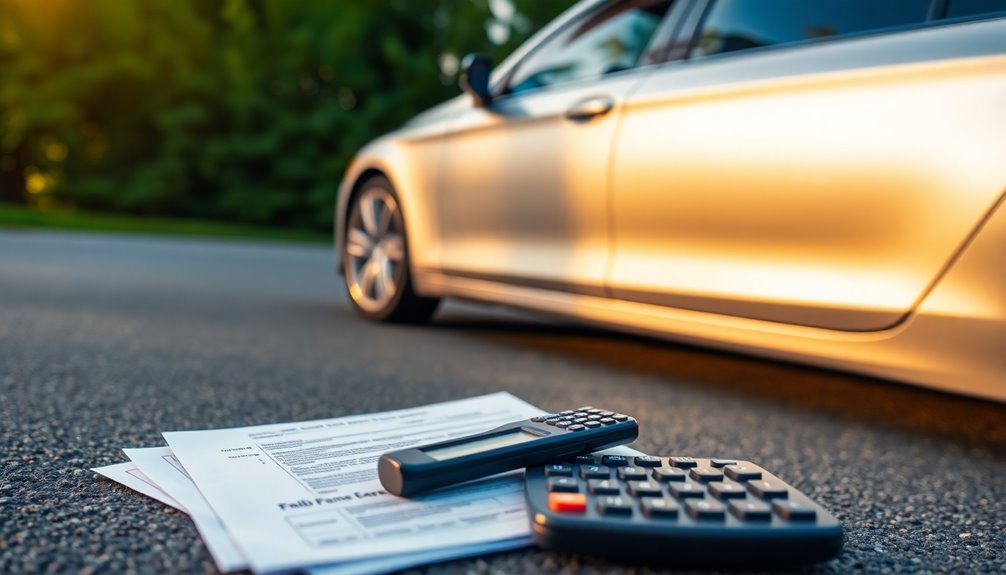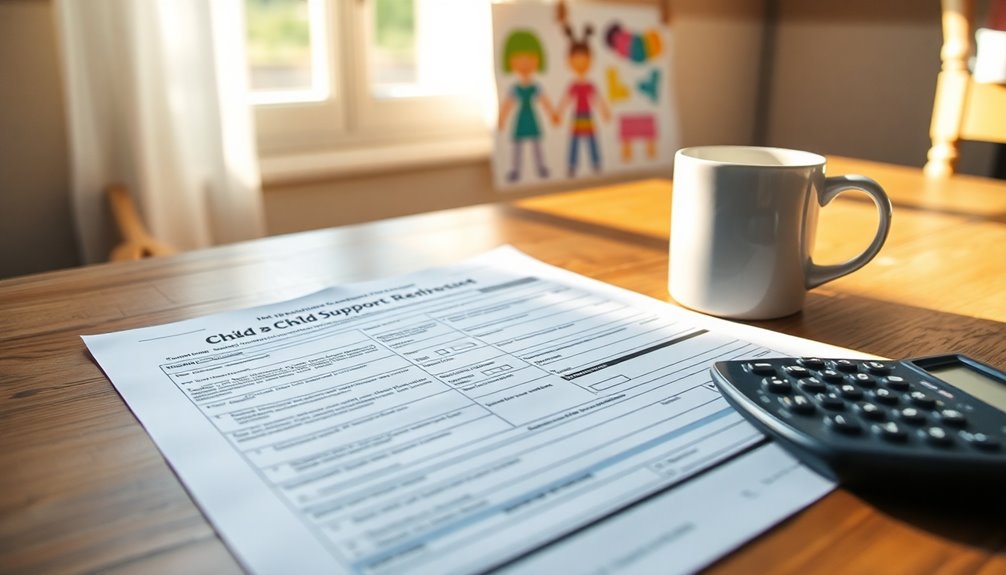Car sales tax can vary a lot based on your state, so it's essential to check local rates. Generally, you'd calculate sales tax by multiplying the car's purchase price by your state's tax rate. For example, if you buy a $22,000 car and your state charges 6.89%, you'd owe about $1,515 in sales tax. Some states have no sales tax at all, while others may have rates over 8%. Don't forget about additional fees like registration and title transfer, which can add to your overall cost. Want to know what specific rates apply in your area?
Key Takeaways
- Car sales tax is calculated by multiplying the purchase price by the applicable state tax rate, which varies significantly across states.
- Some states have no sales tax, such as Alaska and Oregon, offering substantial savings on vehicle purchases.
- Trade-in value can reduce the taxable amount, affecting the total sales tax owed on a new vehicle.
- Additional fees like title transfer, licensing, and registration can increase the total cost of purchasing a car beyond just sales tax.
- Online calculators and DMV tools can help estimate total costs, including taxes and fees, for accurate budgeting.
Understanding Car Sales Tax
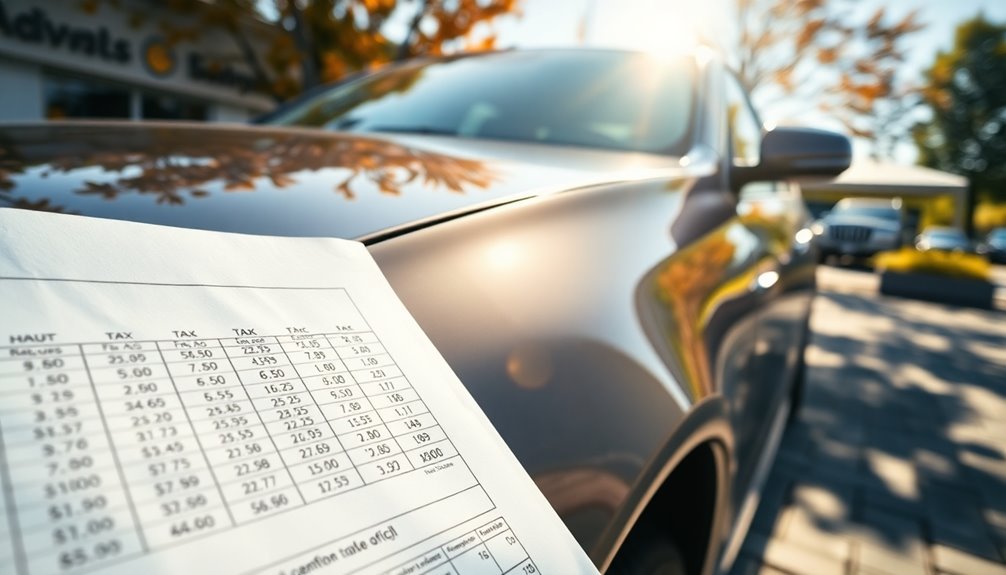
Understanding car sales tax can feel overwhelming, but it's crucial for budgeting your vehicle purchase. To calculate the sales tax, you'll multiply the vehicle's purchase price by the applicable tax rate. The formula is simple: Sales Tax = Purchase Price * Tax Rate. Remember to convert the tax rate from a percentage to a decimal by moving the decimal point two places to the left.
For instance, if you buy a $22,000 car with a 6.89% tax rate, you'll end up paying $1,515.80 in sales tax.
Keep in mind that sales tax rates vary significantly by state and can include local taxes. Some states impose different rates based on vehicle types or included accessories. If you have a trade-in, its value can reduce the taxable amount. Moreover, understanding local tax laws is essential as they can greatly influence your overall vehicle costs.
Don't forget that if you've paid sales tax in another state, you might receive credit toward the sales tax due in your new state.
Additionally, other fees—like registration, title, and emissions testing—can add to your overall cost, so factor those in when planning your budget. Understanding these elements will help you make informed decisions during your vehicle purchase.
Highest Car Sales Tax States

Navigating the landscape of car sales tax can be challenging, especially when you're considering states with the highest rates. If you're in Nevada, be prepared for an eye-watering 8.25% tax on your new ride. Kansas follows with a 7.5% tax, while both California and Illinois levy a tax of 7.25%. Indiana rounds out the top five with a 7.00% rate.
Several states have uniform high tax rates, including Tennessee, Rhode Island, and Georgia, all at 7.00%. Utah and Minnesota aren't far behind, with rates of 6.85% and 6.88%, respectively. It's important to note that local taxes can significantly impact your total tax bill, especially in New York, where combined rates can reach up to 8.88%. New Jersey, Connecticut, and Washington also have notable tax rates of 6.63%, 6.35%, and 6.50%, respectively, with specific considerations like trade-in credits in Washington. Additionally, be aware that state laws may vary, affecting the applicable tax rate in each region.
Before making a purchase, be sure to factor in these rates, as they can drastically affect your final price. Understanding these tax implications is crucial for budgeting your car-buying experience.
Lowest Car Sales Tax States
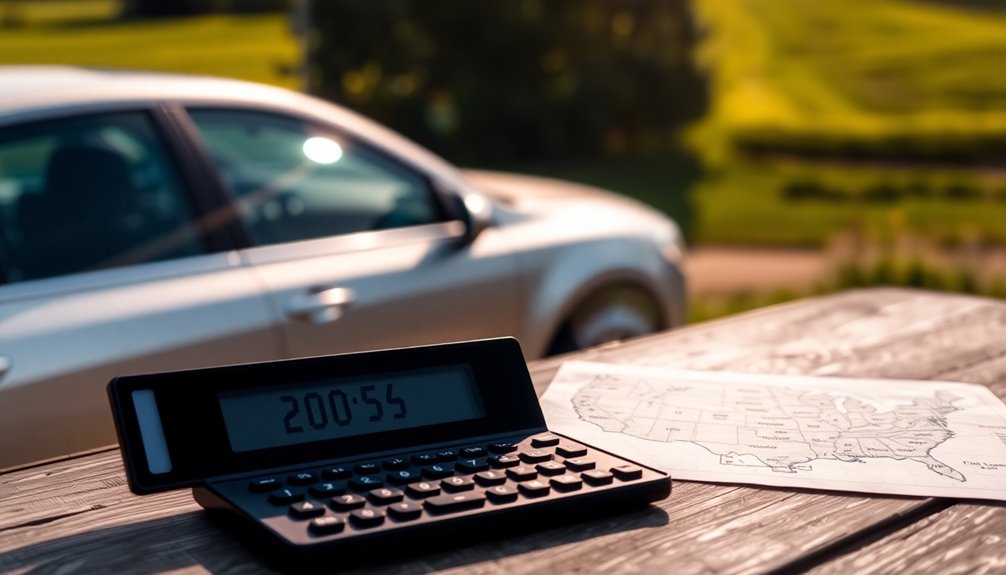
If you're looking for states with the lowest car sales tax rates, you're in luck. Several states don't charge a car sales tax at all. In Alaska, Delaware, Montana, New Hampshire, and Oregon, you won't pay any sales tax when buying a car. This can mean significant savings, especially on higher-priced vehicles. Additionally, the absence of sales tax can make these states particularly attractive for out-of-state buyers.
If you're considering states with very low sales tax rates, Alabama has a mere 2%, while Colorado follows closely with 2.9%. North Carolina imposes a 3% highway-use tax, and Oklahoma has a slightly higher rate at 3.25%. South Dakota is just above this category with a 4% rate.
For states with low sales tax rates, you can find Hawaii, Louisiana, New Mexico, New York, and Wyoming, all at a steady 4%. These rates can be especially beneficial if you're making a big purchase.
Moderate Car Sales Tax States

When you're shopping for a car, knowing the sales tax rates in various states can significantly impact your overall budget. If you're considering states with moderate car sales tax rates, you're looking at a range of 4% to 6.99%.
Hawaii, New Mexico, New York, and South Dakota all boast a car sales tax rate of 4.00%. Louisiana follows closely with a rate of 4.45%. These lower rates can save you a good chunk of change when purchasing a vehicle.
On the higher end of this category, states like Florida, Idaho, Kentucky, Maryland, and Michigan charge 6.00%. While these rates are still manageable, it's wise to factor them into your total cost. Additionally, it's important to note that states like Kansas and California have some of the highest car sales tax rates, which can significantly affect your purchase if you're considering those areas.
It's crucial to remember that these sales tax rates can vary by locality, so always double-check with local authorities.
Understanding these moderate tax rates can help you budget better and make informed decisions when buying your next car. Doing your homework on this can lead to significant savings, so keep these rates in mind as you shop!
Average Car Sales Tax States
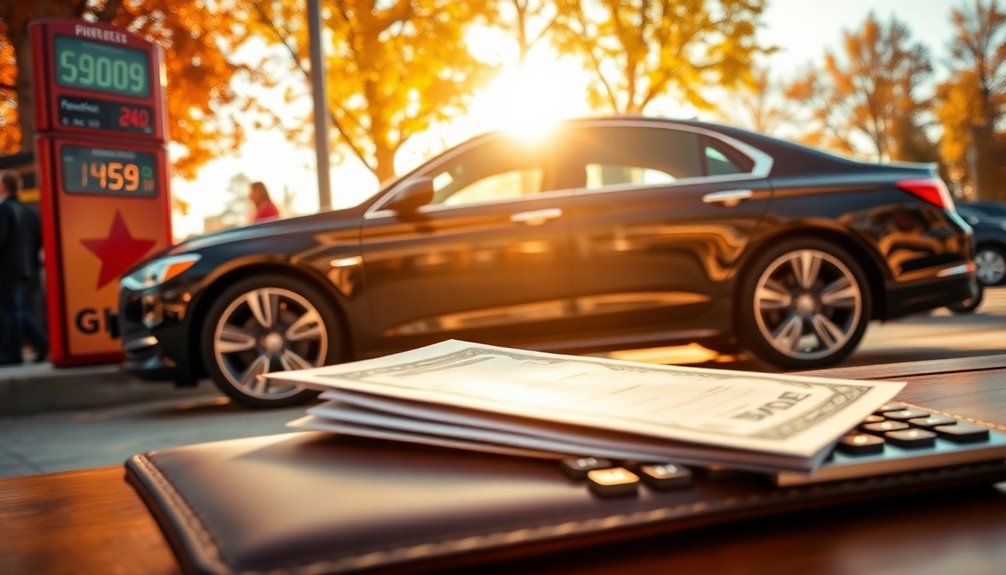
After considering states with moderate car sales tax rates, it's important to look at those that fall into the average category, where rates typically range from 5% to 7.5%. States like Nevada, Kansas, California, Illinois, and Indiana represent this middle ground with sales tax rates that can impact your car purchase significantly. In Nevada, you'll face a rate of 8.3%, which is higher than the average but still worth noting. Kansas and California both hover around 7.5% and 7.3%, respectively. Illinois also matches California's rate. Indiana rounds out this list with a 7% tax.
If you're shopping in New York, the state tax of 4% can be combined with local taxes that push the average to about 7.915%. Furthermore, it's important to keep in mind that combined state and local sales tax rates can significantly vary based on where you live. Arkansas and Georgia have state taxes of 6.5% and 6.6%, respectively, but local taxes can bring your total to 9.448% in Arkansas and up to 8.3% in Georgia. New Jersey follows suit with a similar structure. Knowing these averages helps you prepare for the total cost of buying a car in these states.
Unique Tax Regulations by State
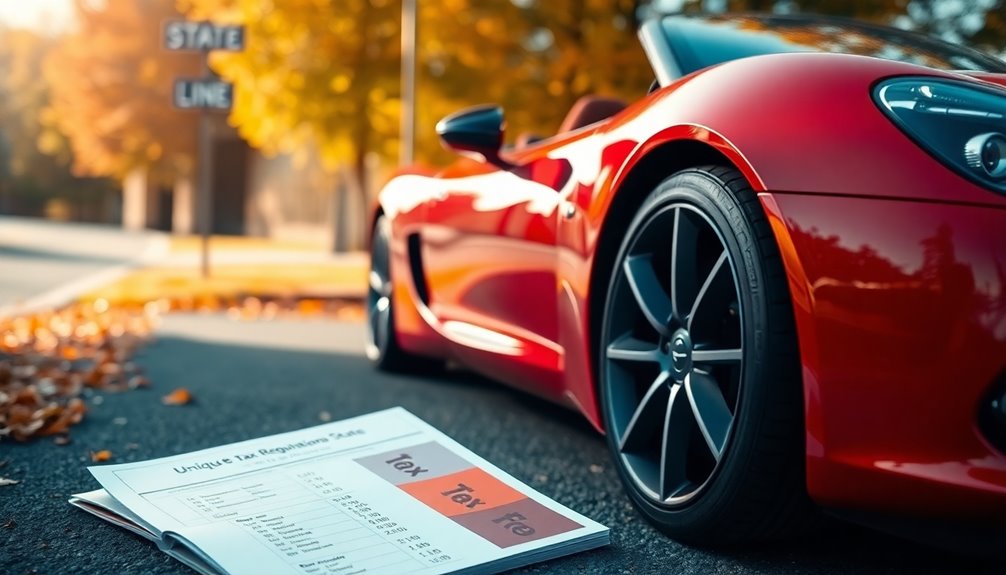
Navigating the unique tax regulations by state can feel overwhelming, especially when it comes to purchasing a car. Each state has its own set of rules, especially for electric vehicles (EVs) and hybrids.
For instance, 19 states offer additional incentives for EV purchases, ranging from $1,000 to $7,500, while some, like Connecticut and Maine, exempt EV purchases from sales tax altogether. This is particularly important as gas tax revenue continues to decline due to the increasing adoption of EVs.
However, don't forget that 24 states impose higher registration fees for EVs, which can vary significantly. You might pay $50 in Hawaii or up to $200 in states like Ohio. If you own a hybrid, you could face additional fees too.
Moreover, states like Iowa and Kentucky impose taxes on public EV charging, affecting your overall cost. Local requirements, such as emission inspections in Georgia, could also add to your expenses.
Weight-based fees in states like Texas mean heavier vehicles will cost you more to register. Understanding these various state-specific taxes and fees is crucial for making an informed car purchase decision.
Calculating Car Sales Tax
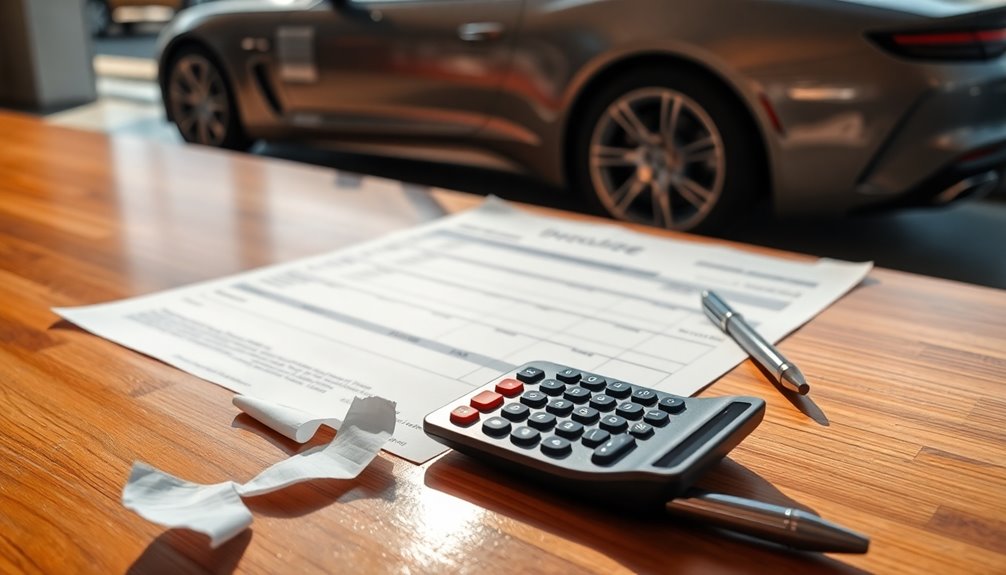
Understanding the unique tax regulations in your state sets the stage for calculating car sales tax accurately. First, determine the local sales tax rate for the area where you're buying the car. This rate often includes both state and local components, so be sure to check your local government website for the most up-to-date information.
To calculate the sales tax, use the formula: sales tax equals the purchase price multiplied by the sales tax rate. For example, if you're buying a $10,000 car with a 9.75% sales tax, it would look like this: $10,000 x 0.0975 = $975.
After calculating the sales tax, add it to the purchase price to find the total cost. Don't forget to account for additional fees like title transfer, which usually ranges from $20 to $40, and licensing and registration fees, which vary based on the vehicle. Understanding that total costs include sales tax, title transfer fees, and registration fees is essential for accurate budgeting.
Lastly, you can simplify your calculations by using online calculators or tools from state departments of motor vehicles. Car dealers can also assist with the tax calculations, ensuring you know the full financial picture before your purchase.
Frequently Asked Questions
Do I Pay Sales Tax on a Car Trade-In?
When you trade in a car, you typically don't pay sales tax on the trade-in value.
Instead, the trade-in amount is deducted from the purchase price of your new car before calculating sales tax. This means you could save significantly, especially in states with high sales tax rates.
However, remember that some states have different rules, so it's smart to check your local laws to understand how this might affect you.
How Do Tax Exemptions Work for Car Purchases?
Tax exemptions for car purchases can vary based on several factors.
If you're buying a vehicle for a non-profit or government entity, you may qualify for an exemption.
Additionally, if you've paid sales tax in another state, you could get credit in your new state.
When trading in a vehicle, the trade-in value can reduce your taxable amount.
Always keep receipts and documentation to prove your exemptions when registering your vehicle.
Are There Additional Fees Besides Sales Tax?
Yes, there're definitely additional fees besides sales tax when you register your vehicle.
You'll encounter registration fees that vary by vehicle type and state.
Depending on where you live, you might also pay vehicle license fees, transportation improvement fees, and infrastructure maintenance fees.
Plus, don't forget about any local fees your city or county might impose.
It's essential to research these costs to budget effectively for your vehicle purchase.
What if I Buy a Car Out of State?
If you buy a car out of state, you'll need to register it in your home state, where sales tax applies. The tax rate matches your home state's rate, and you might pay it at the dealership or local DMV during registration.
Ensure you have proof of tax paid, as you might owe use tax if it wasn't collected.
Also, check emissions standards and local regulations to avoid any compliance issues.
Can I Get a Refund on Sales Tax After Purchase?
Yes, you can get a refund on sales tax after purchase, but there are specific requirements.
You'll need to file your claim within the designated timeframe, usually within four years from your purchase date.
Make sure to include all necessary documentation and use the correct forms.
If your claim's denied, you can appeal it.
Just keep track of deadlines to ensure your request gets processed smoothly.
Conclusion
When buying a car, understanding the sales tax is crucial, as it can significantly impact your total cost. Depending on where you live, tax rates can vary widely, so it's essential to know whether you're in a high, low, or moderate tax state. Take the time to calculate the exact amount you'll owe to avoid any surprises. Being informed helps you make better financial decisions and ensures you're prepared for the expenses that come with your new vehicle.
